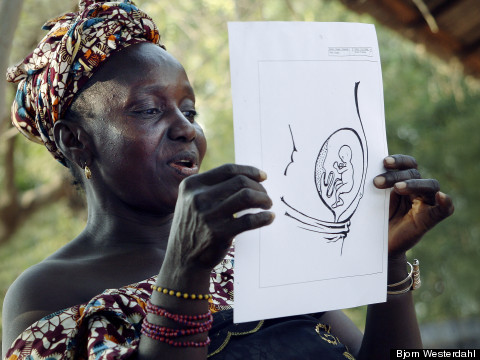Living in Senegal and working in Africa for nearly 40 years, I have met many women unable to receive the kind of care they need to keep healthy, especially when pregnant. Often, this is because of limited access to healthcare facilities or funds for treatment. However, sometimes the reason is more social than circumstantial.
Recently, I met a woman in Senegal who had undergone three pregnancies resulting each time in miscarriage. In her ethnic group, everyone believes that working harder than normal during pregnancy will ensure a bright future for the child. So when she finally became pregnant again, she forced herself to work as hard as possible, even though she tired easily. She was so tired that when one day she decided to rest, her mother-in-law scolded her: "You must continue to work hard. You know your child will not be successful if you don't continue."
In other communities, female genital cutting is upheld within communities as a tradition that ensures marriageability, social respect and success for the woman or girl. The harmful health consequences that may result from this practice can affect a woman throughout her life and especially during childbirth.
In Senegal and throughout West Africa, deeply-rooted social norms such as these are meant to protect and support a woman and her child throughout her pregnancy and after the birth. Unfortunately, these beliefs can also put the mother and child's health at risk. Because pressure from others is so strong, it is not just the pregnant woman herself who needs good health information; the entire group of people in her environment must also understand and encourage good practices.
These communities and their social networks need good, factual information not only on women's health but also on human rights -- in their own language. Discussion on these topics and consensus around changing social norms allows for ownership of the actions people take to improve their health.

Tostan's nonformal education program, which has been implemented in 22 national languages in eight African countries, makes human rights a central focus and while laying the foundation for all other learning in the community. Empowered by knowledge of human rights -- specifically the rights to health, freedom from violence and the power to voice one's opinions -- communities become more attuned to information on health and hygiene, coming together to discuss the practices that are harmful and beginning initiatives to protect the health of women and girls.
Ramatou Diallo is the coordinator of the Health Commission of Sahre Bockar's Community Management Committee, a democratically selected group trained to lead community-designed development projects in Senegal. She has organized awareness-raising campaigns on prenatal risks, helping the community to understand the importance of rest during pregnancy and attending pre- and post-natal consultations. By sharing this information with everyone in the social network, the initiative now means that a mother-in-law there will encourage rest during pregnancy instead of requiring the woman to work harder than normal.
In rural Guinea, the Community Management Committee of Koba M'bendia renovated their health center with their own funds and led awareness-raising events to promote health as a human right and to encourage all community members and their relatives to become involved in protecting pregnant women. They reinforced good health information about germ transmission and the importance of visiting trained health practitioners, especially during pregnancy. Now, a team of villagers ensures that women never miss their pre- and post- natal consultations and give birth at the center.
There are hundreds of other examples such as these, which show how it takes more than one person, one family and one village to support the health of a woman. It takes an entire social network of connected communities to create the social change that positively affects not only one woman but the lives of many women for generations. Across West and East Africa, whole social networks are coming together to declare their collective decision to abandon practices that pose health risks for women and girls and support human rights. This positive social change is led by communities and supported by Tostan and our partners who promote maternal health, including Johnson & Johnson.
At a community-level, the importance of maternal health is shifting. As community members strengthen their understanding of human rights and good health practices, they are making changes both culturally and practically to support the health of women. These communities need our continued support to reach out and share what they have learned with other villagers and bring about large-scale change that can impact the lives of millions.
Molly Melching, Founder and Executive Director of the nonprofit Tostan, is the subject of a new book, However Long the Night: Molly Melching's Journey to Help Millions of African Women and Girls Triumph, by acclaimed author Aimee Molloy. Learn more at www.tostan.org.